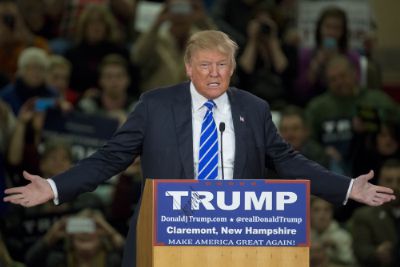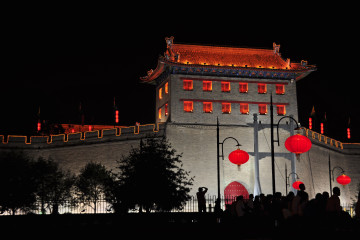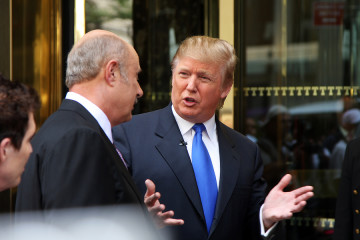Blue Corners of Pennsylvania Went Red, But Won’t Matter: Al Hunt

published Aug 14th 2016, 10:00 am, by Albert R. Hunt
(Bloomberg View) —
The lunch group in Monessen, Pennsylvania, is evenly divided between Trump supporters and Trump opponents. But the dark mood across the whole room suggests why this working-class town might end up favoring him in November.
Monessen, once a steelmaking hub, has steadily lost plants, jobs and population over the decades. Along Donner Avenue, there are more boarded-up buildings than open stores. Mayor Lou Mavrakis points out one that has clearly been inhabited by birds for decades, and not cleaned.
The mayor assembled a group of locals for lunch at Felicia’s Restaurant and Lounge, where they talked about the problems they see at home and abroad. “I’m tired of being a 911 for the world,” says Kevin Iacovangelo, who fixes and sells computers.
This is Westmoreland County. Here and in the adjacent struggling southwestern Pennsylvania counties, Donald Trump hopes to roll up big wins. He campaigned in Monessen early this summer; the last national figure to stump here was John F. Kennedy, for the 1962 midterms.
No state is more central to his uphill quest than Pennsylvania which has voted Democratic in the last six presidential elections. Despite polls showing Hillary Clinton with a comfortable lead, Trump forces insist the state is winnable: “We’re drawing much bigger crowds,” says Dave Urban, a senior adviser to the campaign. “The enthusiasm gap for us in the commonwealth is huge.”
That’s the case in Westmoreland County.
Drive 300 miles east, however, to Montgomery County, and once again Pennsylvania looks like a mirage for Trump. Once a Republican stronghold, this affluent Philadelphia suburb is palpably anti-Trump. Walk into a few stores in Bryn Mawr, on the upper crust Main Line, and the mention of his name draws sneers.
“He’s toast here,” says Mike Gerber, a former state legislator representing Montgomery County, still deeply involved in Democratic politics. Four years ago, President Barack Obama got 57 percent of the vote in Montgomery. Gerber says of Clinton: “She’ll do much better.”
Four big suburban counties — Montgomery, Delaware, Bucks and Chester — together will cast more votes than Philadelphia and Pittsburgh combined. With an influx of young voters, a number fleeing the city, more people of color and especially a growing Asian population, this bloc has turned more Democratic, a trend Trump could accelerate.
In Pennsylvania politics, Westmoreland and Montgomery are polar opposites. As recently as 1988, George H.W. Bush captured 60 percent of the vote in Montgomery County, while Michael Dukakis won Westmoreland.
Trump is a welcome protest vote for many in these hard-pressed communities of southwestern Pennsylvania. At the Monessen lunch, even some of his supporters said he was a “blowhard.” They did not object when others called him a bigot, and nobody took seriously his vow to build a wall along the U.S. border with Mexico.
But voters here like his “to hell with the establishment” style and say he talks about what matters to them. “Trump’s message is very simple,” says State Senator Camera Bartolotta, a Republican. “Let’s make America great again, let’s make America work again and grow again.”
There’s not much love for the party of their parents. Mayor Mavrakis laments the city’s decline. This year the local high school graduated 46, compared with 290 students a half century ago. Meanwhile 10 percent of a tight budget goes to pay off debt, and he contends a federal infusion of $3 million to raze the boarded-up buildings might pave the way for revitalization. A longtime Steelworkers Union official, he says it would “kill me” to vote Republican — but he says he’ll go for whoever can get him that funding.
Across the state, the Trump campaign insists it’ll campaign for the big suburban vote; plans are afoot to send Trump’s children into these counties as campaign proxies. But they’re trying to buck an anti-Republican trend. Lois Sherman Hagarty was a Republican state legislator from Montgomery County, but as the party turned right she switched: “My party left me on social and environmental issues.” She’s for Clinton.
Trump may make the GOP’s slide worse. Bob Butera was a Republican leader in the state legislature and a candidate for governor in the late 1970s. His wife is now solidly with Clinton, and while he doesn’t share her enthusiasm for the Democratic candidate, he’s certain he won’t vote for Trump. Butera says “he’s not qualified or competent to be president.”
Ed Rendell, the former mayor of Philadelphia and Democratic governor, offers insight into what could still be a close contest if the Trump campaign doesn’t implode. Obama ran up a margin of almost 595,000 votes in Philadelphia and Allegheny County (Pittsburgh) four years ago; assume maybe that’s shaved by 15 percent with less enthusiasm for Clinton. The rest of the state, minus the Philadelphia suburbs, Mitt Romney won by 400,000 votes; with his appeal in southwestern Pennsylvania, give Trump an extra 100,000 votes.
That would make it even coming into Montgomery and the three other suburban counties, which last time gave Obama a 123,000-vote margin. Franklin and Marshall College’s recent poll suggested she enjoys an advantage in these suburbs of more than two to one.
More than a few Republicans, and most Democrats, think she’ll double the president’s victory margin.
This column does not necessarily reflect the opinion of the editorial board or Bloomberg LP and its owners.
To contact the author of this story: Albert R. Hunt at ahunt1@bloomberg.net To contact the editor responsible for this story: Philip Gray at philipgray@bloomberg.net
For more columns from Bloomberg View, visit Bloomberg view
COPYRIGHT
© 2016 Bloomberg L.P







No Comment